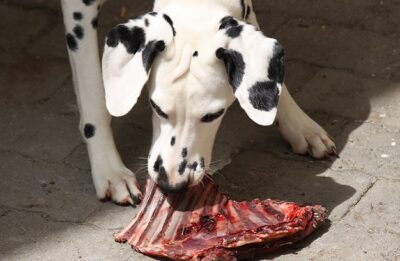As a dog owner, you may have wondered if it’s safe for your furry friend to chew on rib bones. While bones can be an appealing and natural chew toy for dogs but can dogs eat rib bones? Whether you’re looking for a healthy chew option or want to treat your dog to something special, I must inform you about the potential risks and benefits of feeding rib bones to your furry friend.
Rib bones are not recommended for dogs to eat rib bones. While it may seem like a natural and tasty treat for your dog, bones can splinter and break, which can cause blockages or cuts in your dog’s digestive system. This can lead to serious health issues, including pain, vomiting, and even death.
Additionally, cooked bones are more likely to splinter and cause problems as they become brittle. If you choose to give your dog a bone, monitoring them closely to ensure they do not break off and swallow any splinters is essential.
Can Dogs Eat Rib Bones?
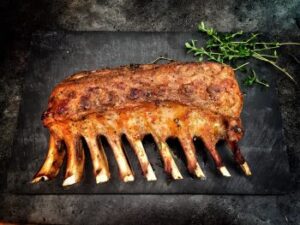
It is generally not recommended to feed rib bones to dogs. Though bones can be an appealing and natural chew toy for dogs, they can also pose several risks to your dog’s health. Here are a few reasons why rib bones may not be safe for dogs:
1. Choking hazard: Rib bones can break into small, sharp pieces that can cause choking or become lodged in your dog’s throat.
2. Blockage risk: Rib bones can become stuck in your dog’s digestive system, leading to blockages and potentially requiring surgical intervention.
3. Mouth injuries: Chewing on rib bones can cause cuts or abrasions inside your dog’s mouth, leading to infection.
4. Fragile bones: Rib bones are thin and brittle, which makes them more prone to breaking or splintering. This can cause serious injuries or damage to your dog’s digestive system.
Always be mindful of the potential risks of feeding rib bones to your dog and consider safer alternatives such as chew toys or other types of bones specifically designed for dogs. If you have any concerns about your dog’s diet or health, it’s always best to consult a veterinarian.
Is it safe for dogs to eat rib bones?
In a nutshell, rib bones are not safe for dogs to eat. While some dogs may be able to eat rib bones without any issues, it is still risky and can lead to serious health problems for your dog. Rib bones can splinter and break into sharp pieces when chewed, which can cause injury to your dog’s mouth, throat, or digestive system.
These splinters can also become stuck in your dog’s throat or digestive system, leading to blockages or perforations.
In addition, rib bones can also cause constipation or diarrhea in some dogs. If your dog does swallow a splinter, it can cause serious health problems and may require surgery to remove it. It is always best to err on the side of caution and avoid giving your dog rib bones to chew on. If you want to treat your dog, there are many safer options, such as dental chews, chew toys, or treats specifically designed for dogs.
Can dogs eat cooked or raw rib bones?
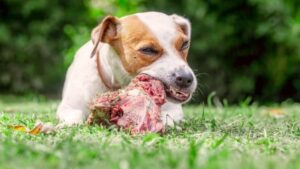
Generally, cooked bones are not recommended to feed dogs, including rib bones, because they can splinter and cause blockages or tears in the digestive tract. Cooked bones are more brittle and can break into sharp pieces that can cause serious injury to a dog if swallowed.
Raw bones, however, can be a safe and beneficial part of a dog’s diet. However, choosing the right type of bone for your dog and supervising your dog while chewing on a bone is crucial.
Rib bones can be a suitable choice for dogs to chew on, but it is vital to choose bones appropriate for your dog’s size and strength. Smaller dogs may be able to handle smaller rib bones, while larger dogs may handle larger ones. Try to monitor your dog while chewing on a bone to ensure they are not swallowing large pieces or splinters.
What are the potential benefits or risks of feeding rib bones to dogs?
Feeding rib bones to dogs can have both potential benefits and risks.
Benefits:
· Chewing on bones can provide dental benefits for dogs by helping to remove plaque and tartar from their teeth.
· Chewing on bones can also provide mental stimulation for dogs, which can help prevent boredom and destructive behaviors.
· Some people believe that feeding bones to dogs can also provide nutritional benefits, such as helping to maintain healthy joints and providing a source of calcium and other minerals.
Risks:
- There is a risk of dogs choking on bones, especially if the bones are small or splinter easily.
- Dogs risk developing gastrointestinal issues, such as blockages or tears in the digestive tract, if they swallow large pieces of bone.
- There is a risk of bones becoming lodged in the mouth or throat, which can cause injury or even death.
- Cooked bones are more likely to splinter and cause injury, so it is generally recommended to only feed dogs raw bones.
It is important to carefully supervise dogs while chewing on bones and choose bones that are appropriate for their size and chewing habits. If you are unsure whether a particular type of bone is safe for your dog, it is best to consult your veterinarian.
Can rib bones be harmful to dogs with certain health conditions?
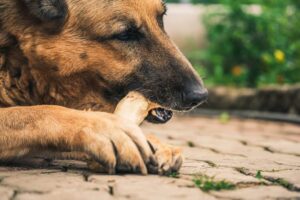
Yes, rib bones can be harmful to dogs with certain health conditions. Before giving them bones to chew on, it is crucial to be aware of your dog’s health and any potential risks.
For example, dogs with pancreatitis or other digestive issues may be more prone to digestive issues and should avoid bones. Dogs with dental problems or missing teeth may also have difficulty chewing bones and could break a tooth or swallow pieces of bone that could cause blockages or other issues.
Additionally, bones can splinter and cause injury to a dog’s mouth, throat, or digestive system. It is always a good idea to supervise your dog when they are chewing on bones and to take the bone away if it becomes small enough to swallow or if it shows signs of splintering.
Is it okay to give my dog rib bones as an occasional treat?
Giving dogs cooked rib bones is not recommended as an occasional treat. Cooked bones can splinter and break easily, which can cause blockages or tears in the digestive system and potentially lead to serious health issues. Raw bones, on the other hand, can be a good source of nutrition for dogs and help keep their teeth clean.
However, it is vital to ensure that the bones are appropriate for your dog’s size and chew style and supervise your dog while chewing on any bones.
Also, good to note that some bones, such as chicken or pork ribs, may be too small or thin for dogs to chew safely, as they can easily splinter or break. It is best to choose bones that are large enough for your dog to chew on safely and to discard any bones that become small enough to swallow whole or that have splintered.
How much rib bone can a dog safely eat?
It is generally not recommended for dogs to eat rib bones because they can splinter and cause blockages or tears in the digestive system. However, if a dog does consume a small amount of rib bone, it is not likely to cause any severe problems. It is crucial to monitor your dog closely after they have eaten a rib bone and to seek veterinary care if you notice any signs of discomfort or illness.
The amount of rib bone that a dog can safely eat will depend on the size and breed of the dog and the size and thickness of the rib bone.
It is best to err on the side of caution and avoid giving your dog rib bones to chew on altogether. If you choose to give your dog a rib bone, supervise them closely and remove the bone if it starts to splinter or break apart.
Can rib bones splinter and cause harm to a dog’s digestive system?
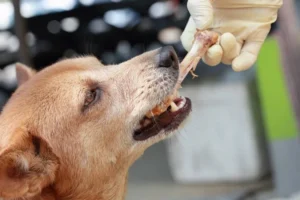
Surely, cooked rib bones can splinter and break easily, which can cause blockages or tears in a dog’s digestive system and potentially lead to serious health issues. When bones are cooked, the heat and moisture can cause them to become brittle and more prone to splintering, which can lead to injury if ingested.
Raw bones, on the other hand, are less likely to splinter and cause harm to a dog’s digestive system. However, it is still essential to ensure that the bones are appropriate for your dog’s size and chew style and supervise your dog while chewing on any bones.
Some bones, such as chicken or pork ribs, may be too small or thin for dogs to chew safely, as they can easily splinter or break. It is best to choose bones that are large enough for your dog to chew on safely and to discard any bones that become small enough to swallow whole or that have splintered.
Is it better to give my dog bones from a specific type of meat?
It is safe for dogs to eat bones from various types of meat, including chicken, beef, and pork. However, it is essential to ensure that the bones you give your dog are raw and uncooked, as cooked bones can splinter and cause blockages or tears in the digestive system. It is also a good idea to avoid giving your dog bones too small, as they can pose a choking hazard.
Choosing bones appropriate for your dog’s size and chew strength is generally best. For example, larger dogs may be able to handle larger bones, while smaller dogs may do better with smaller bones. You should also avoid giving your dog bones that have been smoked or flavored, as these may contain additives that are not safe for dogs.
If you are unsure what type of bones to give your dog, it is a good idea to consult your veterinarian or a professional dog trainer for advice. They can recommend safe and appropriate bones for your dog based on their size, breed, and chewing habits.
Are there any alternatives to rib bones that are safer for dogs to chew on?
There are many alternatives to rib bones that you can give to your dog to chew on. Some options include:
- Nylabones: These are synthetic bones made of nylon explicitly designed for chewing. They come in various shapes and sizes and can be a good option for dogs who like to chew.
- Chew toys: There are many chew toys available, such as rubber toys, rope toys, and antlers. These can provide a safe and satisfying chewing experience for your dog.
- Rawhide chews: These are thin strips of hide that have been treated and shaped into different forms. They are a popular chewing option for dogs, but it’s essential to supervise your dog when chewing on rawhide to ensure they don’t swallow any large pieces.
- Dental chews: These are treats that are specifically designed to help clean your dog’s teeth and promote healthy gums. They come in various flavors and shapes and can be a good option for dogs who need chewing and dental care.
It’s important to remember that no chew toy or bone is completely indestructible, and it’s always a good idea to supervise your dog when chewing on anything if you have any concerns about your dog’s chewing habits.
How should rib bones be prepared or served to dogs?
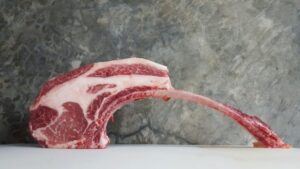
If you choose to give your raw dog bones, handling them safely to minimize the risk of contamination is essential. Store raw bones in the refrigerator or freezer until they are ready to be served to your dog. When prepared to give your dog a bone, washing your hands thoroughly before and after handling the bone is a good idea. You should also clean any surfaces that the bone comes into contact with to prevent the spread of bacteria.
It is also vital to choose bones that are appropriate for your dog’s size and chew style. Some bones, such as chicken or pork ribs, may be too small or thin for dogs to chew safely, as they can easily splinter or break. It is best to choose bones that are large enough for your dog to chew on safely and to discard any bones that become small enough to swallow whole or that have splintered.
What should I do if my dog eats too much rib bone or has a reaction to it?
If you are concerned that your dog has overeaten bone or is reacting to a bone they have consumed, it is essential to seek veterinary care as soon as possible. Symptoms that may indicate a problem include vomiting, diarrhea, loss of appetite, lethargy, or difficulty breathing.
If you cannot get in touch with a veterinarian immediately, you can try to remove any small pieces of bone or splinters that you can see in your dog’s mouth or on the ground. However, be sure to use caution and avoid putting your fingers or hands near your dog’s mouth, as they may accidentally bite you in their discomfort.
If your dog is experiencing difficulty breathing, you should seek emergency veterinary care immediately. Difficulty breathing can be a severe condition that requires immediate treatment.
Conclusion
Finally, on this question, of whether can dogs eat rib bones is that rib bones are not a perfect treat for your dogs because cooked bones can splinter and break, which can cause blockages or tears in the digestive system and potentially lead to serious health issues.
While some dogs can chew and digest rib bones without any issues, others may experience digestive problems or even break their teeth on the bones.
In addition, rib bones have the potential to splinter and cause blockages or tears in the digestive tract, which can be dangerous and potentially life-threatening for dogs. It is always best to err on the side of caution and avoid giving your dog rib bones to chew on. If you want to provide your dog with a safe and appropriate chewing outlet, many other options are available, such as approved chew toys or treats.

